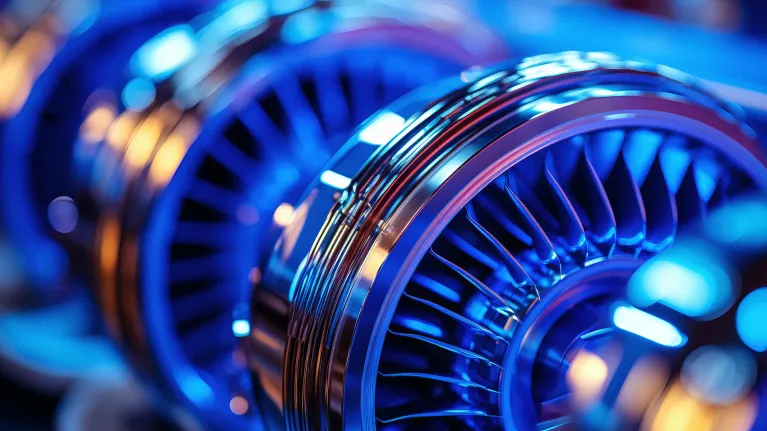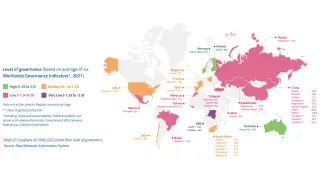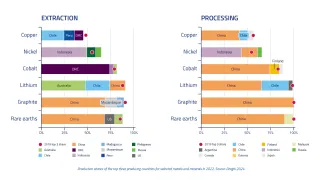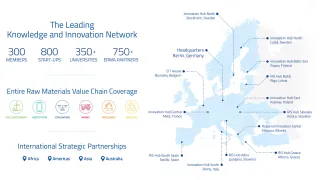
Securing Europe’s competitiveness through innovation and education in raw materials
1. Transforming Raw Materials into a Strategic Strength for Europe
Raw materials are crucial for Europe’s green and digital transformation. The European economy is heavily dependent on imports for most of the Critical and Strategic Raw Materials (CRMs and SRMs) necessary for key sectors such as renewable energy, battery technologies, advanced manufacturing, defence and aerospace. Currently, Europe imports almost all key battery raw materials (80-100% of EU consumption of key materials), often from geopolitically challenging regions, making our economy vulnerable to external shocks. European vehicles, machinery, and energy technology manufacturers rely almost exclusively on rare earth permanent magnets from Asia to produce the most efficient electric motors and generators. Similarly, the EU aerospace and defence sector relies heavily on import-dependent CRMs and SRMs used in high-performance applications including aircraft and marine systems.
"Security is a precondition for sustainable growth. Europe is particularly exposed. We rely on a handful of suppliers for critical raw materials, especially China, even as global demand for those materials is exploding owing to the clean energy transition."
M. Draghi, The Future of European Competitiveness 2024
The Solution: Europe must reduce dependency on single external suppliers and focus on building a resilient, sustainable supply chain for critical raw materials and advanced materials. Europe must diversify supply via new collaborations with like-minded global partners. Investing in innovation in mining and education, materials processing, and recycling will create millions of high-quality jobs, drive economic growth, and significantly reduce environmental impacts, building the foundation for a sustainable, competitive and independent Europe.

EIT RawMaterials calls for an immediate commitment to invest €4 billion under the upcoming Framework Programme 10 (FP10) into the European raw material sector to promote research, innovation and industrialization essential to achieving Europe’s strategic goals.
EIT RawMaterials is the sector’s leading knowledge and innovation community with more than 300 partners comprising the leaders in industry, research and technology and academia across the raw materials value chain. EIT RawMaterials has successfully deployed over €600mn in strategic funding under the Horizon Europe programme, unlocking secondary funding into research, innovation, upscaling, skills and raw materials projects of more than ~€3.6bn. The European Raw Materials Alliance (ERMA), led by EIT RawMaterials, has grown to over 750 members with an overall investment potential of ~€50 billion and the potential to close the EU raw materials’ supply-demand gap by between 20-100% across a range of CRMs and SRMs.
"The dependence on individual raw material suppliers is a risk. That is why we want to use new projects in Europe, but also partnerships with countries such as Australia, USA and Canada, to create alternatives in order to secure the supply chains of European companies."
U. von der Leyen, European Commission President, 2023
2. Key Challenges: Why Immediate Action is Critical
Supply Chain Vulnerabilities: Europe is highly dependent on China for CRMs and SRMs, such as lithium, magnesium, vanadium, and rare earth elements as well as advanced materials produced using these materials. In 2022, Chinese companies controlled 50-70% of the global battery and advanced materials supply chains. Without immediate action, Europe risks falling further behind in clean technology development, jeopardizing its industrial competitiveness and sustainability goals.
Sustainability: Europe has been a leader in setting the sustainability and net-zero agenda for the world. Hence, Europe must not shy away from leadership in developing and deploying extraction and circularity technologies and practices that minimize the impact of resource extraction on ecosystems and communities across the world, while continuing to drive the green transition.
Economic Momentum and Job Creation: Europe’s transition to a sustainable economy presents a massive economic opportunity. By 2030, securing a stable supply of Critical Raw Materials could generate €2.0 trillion in value and create more than 32 million jobs across sectors, including clean energy, automotive, and manufacturing.

3. Securing Europe’s Independence: A Call to Action
The Critical Raw Materials Act (CRM Act) sets ambitious goals to reduce dependency on third-country suppliers by focusing on domestic production, processing, and recycling. To achieve these goals by 2030, Europe must:
- Increase domestic mining to supply at least 10% of Europe’s Critical Raw Materials’ needs.
- Expand processing capacity to cover 40% of Europe’s demand.
- Accelerate recycling efforts to reclaim 25% of end-of-life products.
- Diversify supply sources to ensure no more than 65% of any material comes from a single external country.
To meet the goals outlined in the Act, Europe must increase investment in innovation and education in the raw materials sector through FP10.
4. Key Areas of Investment for Europe’s Strategic Transformation
Sustainable Mining: Europe must invest in fully digitalized and automated mines, which will improve efficiency, minimize environmental impact, and increase societal acceptance of mining. Advanced technologies like drones, AI, and automation will transform the sector, making mining safer and more productive. Europe is home to the world’s leading mining technology companies, providing us with a unique competitive advantage in a market that is expected to grow annually by 10%.
EIT RawMaterials Success Story: AutoBoldReload Developed an automated solution that significantly increases the safety and productivity of underground mining, reducing reliance on manual labour and improving operational efficiency.
Advanced Materials for a Green Economy: Europe must lead in the development of advanced materials that reduce dependence on Critical Raw Materials. These innovations will drive efficiency in clean technologies, from batteries to renewable energy to low-carbon steelmaking, for Europe not just to meet the requirements of a growing market but also mitigate geopolitical and market risks.
EIT RawMaterials Success Story: Esilib Created nanoporous silicon-based anode materials that reduce battery weight by 40% and enable 5-fold faster charging, critical for competitive battery production in Europe, estimated to become a €60 billion market by 2035.
Recycling and Circular Economy: Strategically investing in the capacity of our Circular Economy is key to reducing Europe’s dependence on imported raw materials and lowering environmental footprints. Scaling up recycling facilities will allow Europe to recover valuable resources from end-of-life products and tailings, retaining value within Europe and reducing carbon intensity.
EIT RawMaterials Success Story: Relieve Building a large-scale recycling facility for end-of-life batteries, expected to create thousands of jobs and reduce reliance on foreign suppliers for battery-grade lithium, cobalt, nickel, graphite, and manganese.
5. Talent and Workforce Development: Europe’s Raw Materials Champions
Europe’s raw materials sector will require over 1.2 million new workers by 2030 to meet the demand for skilled labour in sustainable mining, material science, and recycling technologies. EIT RawMaterials is a leader in this arena, having engaged and trained over 100,000 students and professionals through the Higher Education Institutions (HEI) Initiative and Girls Go Circular (GGC) programme, and continues to scale up rapidly with a particular focus on increasing the participation of women in the industry.
EIT RawMaterials Success Story: EIT-labelled Masters’ programmes
Creating highly skilled professionals with expertise in raw and advanced materials, with a strong focus on entrepreneurship, business creation and circularity through over 10 specialised Masters’ programmes covering the full raw materials value chain from exploration to recycling and advanced materials.
"Atlantic Copper is a processing innovation pioneer and committed to balancing industrial excellence and environmental stewardship. We are pleased to partner with EIT RawMaterials for an Open Innovation Challenge, a fantastic medium to connect businesses with emerging talent and unlock the potential of the next generation of environmental problem-solvers."
Guillermo Ríos, Innovation and Technology Director, Atlantic Copper
6. Key Recommendations to Framework Programme 10
In order to make the next decade the foundation of a sustainable, competitive and independent Europe, EIT RawMaterials calls for an immediate commitment to invest €4 billion under FP10 into the European raw material sector to promote research and innovation in the following critical areas:
I. Invest in Disruptive Technologies and pre-Industrial Upscaling: Europe must regain global leadership in break - through technologies as an enabler to capture the full potential of its resources, and to reduce the impact of raw material extraction and processing. This includes, for example, breakthrough technology for rock grinding, Direct Lithium Extraction (DLE) and advanced sorting and dismantling technologies in recycling that allow for more efficient resource use.
II. Accelerate and facilitate a functioning Circular Economy: Support large-scale investments in industrial symbiosis (waste from one company is the raw material for another), design of advanced materials and products, and recycling technologies that enable reclaiming CRMs along the full value chain of products such as batteries and magnets. Europe must close the loop on resource use, rigorously stopping export of feedstock for recycling, keeping valuable materials in circulation and reducing dependency on imports.
III. Strengthen Public-Private Partnerships: Collaboration between European and member state governments, academic and research institutions and industry is key to unlocking the necessary funding and innovative spirit necessary for a transformation of Europe’s raw materials landscape, and therefore essential to the Green Transition. EIT RawMaterials recommends allocating €1 billion to a dedicated public-private partnership in raw materials to help unlock the full potential of additional private investments.
IV. Support Workforce Development: A green and digital Europe requires a highly skilled workforce. EIT RawMaterials recommends targeted strategic funding to train the 1.2 million workers needed by 2030, ensuring Europe’s talent pool is future-ready.
- Upskill the current workforce: Provide targeted training on digital mining, processing and sustainability practices.
- Develop new academic programs: Deepen partnerships across the knowledge triangle between research organisations, universities and industry to create specialized courses in raw materials innovation, development and application.
Expand apprenticeship and vocational training: Build a talent pipeline that supports the rapid expansion of Europe’s raw materials sector.
"We need an enabling business environment, a workforce with the right skills and access to raw materials our industry needs."
President U. von der Leyen, State of the Union, 2022
7. Conclusion: Securing Europe’s Raw Materials Future
EIT RawMaterials is committed to leading Europe’s transformation towards global leadership in raw materials and advanced materials innovation. With a dedicated investment strategy in technology and workforce development along the full value chain, from exploration to recycling and advanced materials, Europe can build resilient supply chains, secure its industrial competitiveness, create and maintain millions of high-quality jobs, and lead the world in sustainable resource management.
The time to act is now. Let’s make the next decade the foundation of a sustainable, competitive and independent Europe.

EIT RawMaterials is supported by the European Institute of Innovation & Technology (EIT). EIT Knowledge and Innovation Communities have built Europe’s largest innovation network, bringing together more than 2,400 key organisations in business, education, and research with activities in each EU Member State, strategic partner nations and beyond. The EIT ecosystem has achieved strong performance on key indicators, training over 800,000 direct learners, and powering more than 10,000 start-ups collectively valued at approximately €72 billion at the end of 2023. EIT-supported ventures have attracted investments of over €9.2 billion.
[1] The CRMA sets out ambitious targets for mining, processing, recycling, and creating a diversified supply of raw materials. EIT RawMaterials estimates a public and private sector investment need of €80-100 billion to achieve security of supply across the 34 Critical Raw Materials identified by the European Commission, and a requirement for R&D investments to achieve these goals at ~10% of the investment value. Assuming FP10 and private sector funding in equal parts, this calls for a provision of €4-5bn for the raw materials sector under FP10.